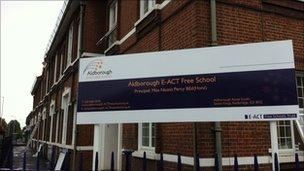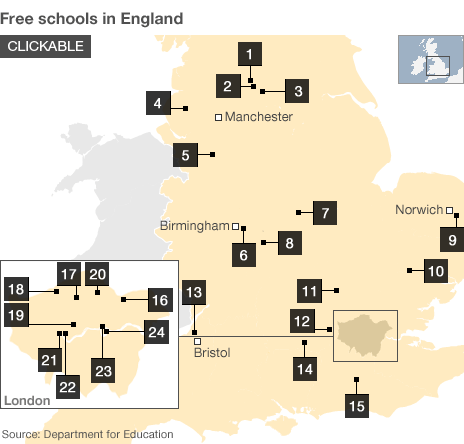Nick Clegg rules out running free schools for profit
- Published
- comments
Deputy Prime Minister Nick Clegg has said those running England's free schools will not be able to do so for profit.
The first wave of the flagship state-funded, but independent schools, some 24, are opening this term.
Education Secretary Michael Gove has said profit is not needed in free schools at the moment.
But Mr Clegg said the schools would not become "the preserve of the privileged few".
In his speech in London on Monday, aimed at reassuring Liberal Democrat sceptics, Mr Clegg said he was confident the schools would give "fairer chances" to children from the most deprived backgrounds.
Some Lib Dems have opposed them amid fears they could be socially divisive.
'Risks'
Mr Clegg admitted the schools were seen as controversial by many and came with risks, but also said they would improve standards and integration.

The Redbridge free school will offer an extended day and different school year
"To anyone worried that, by expanding the mix of providers in our education system, we are inching towards inserting the profit motive into our school system, again, let me reassure you," he said.
"Yes to greater diversity; yes to more choice for parents. But no to running schools for profit, not in our state-funded education sector."
He added that he thought tax payers would not think it was fair for schools to make a profit.
Mr Clegg added that free schools "must not be the preserve of the privileged few - creaming off the best pupils while leaving the rest to fend for themselves, causing problems for and draining resources from other nearby schools".
"So let me give you my reassurance - I would never tolerate that," he said.
Mr Clegg also called on free schools to admit at least the same proportion of free school meal pupils as the local average and open up facilities to the local community.
But Mr Clegg warned that parents had to "do their bit too" to help with their children's schooling.
"The fact is - if you don't take an interest in your child's education, teachers cannot make up the shortfall.
"We currently have the most talented generation of teachers this country has ever seen. But they cannot do everything," he said.
Mr Gove has denied he was forced to back down by Mr Clegg after reports he would allow free schools to make profits if the Conservatives formed a government with an overall majority after the next general election.
On Sunday he told the BBC that he was in complete agreement with Nick Clegg and that they both believed we do not "need to have profit at the moment".
But Mr Gove also said: "I'm a pragmatist not an ideologue, so I don't have any particular opposition to involving any organisation that is going to improve our education. However, we don't need to have profit-making organisations involved at the moment."
Free schools have been set up by educational charities, groups of teachers - and in a number of cases, parents.
They operate as academies, and like them, do not have to follow the national curriculum, can vary the pay and conditions of teachers, are directly funded by central government and are outside of local authority control.
The government says free schools will meet parental demand in areas where there is a shortage of places and help drive up standards by providing competition.
But critics argue they will take pupils and money from other schools at a time of cutbacks and could break up the state education system.

Bradford Science Academy
Secondary school, taking 140 children a year. Led by Bradford-born teacher Sajid Hussain.Rainbow Free School, Bradford
Primary school set up by the social enterprise body Asian Trade Link, with support from cricketer Imran Khan.Batley Grammar School, Kirklees
Mixed private school returning to the state sector under the free schools programme.Maharishi School, Lancashire
Non-selective independent school for ages 4 - 16. Teaches transcendental meditation and is transferring to the state sector.Sandbach School, Cheshire East
Boys' secondary school which was technically independent, but fully-funded by Cheshire County Council and a local authority school.Nishkam Free School, Birmingham
Primary school run by the Nishkam Education Trust "the first state-funded, Sikh ethos, multi-faith school in the Midlands".Krishna Avanti Primary School, Leicester
Hindu faith school run by the I-Foundation. Children will eat vegetarian meals and practice yoga and meditation.Priors Free School, Warwickshire
Small private primary school with just 60 places, returning to the state sector.The Free School, Norwich
A primary school opening in a Georgian house which was previously used as offices.Stour Valley Community School, Suffolk
Secondary school set up after a campaign by parents, on the site of an existing middle school was facing closure.Moorlands School, Luton
An independent prep school transferring to the state sector.Langley Hall Primary Academy, Slough
Set up by a husband and wife team, the school is "underpinned by Christian principles".Bristol Free School, Bristol
Parent-led secondary school, opening to Year 7 pupils in temporary buildings. An educational trust will run the school.All Saints Junior School, Reading
School for 7 to 11 year olds, run by the educational trust CfBT. It will take up to 25 children, all in its youngest age group, each year.Discovery New School, West Sussex
Montessori primary school with "a Christian character in the Anglican tradition".Aldborough E-ACT Free School, Redbridge
Primary school run by a charitable trust set up by E-ACTEden Primary, Haringey, North London
Jewish primary school "independent of any synagogue authority" and open to all members of the Jewish community.Etz Chaim Jewish Primary School, Mill Hill, London
Jewish primary with "very strong link with the local community and Mill Hill United Synagogue". Space for 28 children in reception.Ark Atwood Primary Academy, Westminster
Primary school run by the education charity Ark.Woodpecker Hall Primary Academy, Edmonton, London
"Sister school" to a nearby over-subscribed primary, Cuckoo Hall Academy. Will eventually have 420 pupils.West London Free School, Hammersmith, London
Mixed, non-selective secondary taking 120 pupils a year, set up by a parents' group led by writer Toby Young, as a "grammar school for all".Ark Conway Primary Academy, Hammersmith & Fulham
One-form entry school set up by the Ark education charity.Canary Wharf College, Tower Hamlets
Christian school with an average class size of 20. Open for children in reception, Year 1 and Year 2.St Luke's Church of England Primary School, Camden, north London
Parent- and church-led, set up in a church hall, with places for those living closest to the school.'Completely undemocratic'
Martin Johnson, deputy general secretary of the Association of Teachers and Lecturers (ATL), said the government seemed to be "very comfortable with the idea of state-funded schools being run for profit".
"The government is setting everything in place for this, and the only missing piece of the jigsaw is a legal clause," he said.
Although academies and free schools cannot be run for profit, many are run by private, non-profit making organisations - some of which run "chains" of several schools.
Education Secretary Michael Gove refutes reports he has plans to allow for-profit free schools.
The National Union of Teachers said Mr Clegg had chosen to "disregard" his own party members who rejected the free schools policy and was "trying to salvage a policy that is neither wanted nor needed".
"At a time of huge cuts to education provision this is quite a disgraceful waste of public money," said NUT general secretary Christine Blower.
Head of the UCU lecturers' union, Sally Hunt, said: "I am pleased that Nick Clegg has drawn a clear line over for-profit schools and academies. It is essential that he now extends this commitment to colleges and universities."
But Lib Dem peer and former education spokesman, Lord Willis, said the expansion of free schools would depend on allowing providers to make a profit.
"The reality is the free school movement is not going to take off unless the profit motive is brought in," Lord Willis told the BBC.
'At least double'
Of the 24 free schools opening this month, nine are faith-based or have strong religious ethos, six are parent- or teacher-led and five will be run by trusts already running academies. Four are private schools transferring to the state sector. Some schools fit into more than one group.
The government says it wants the total number of free schools to "at least double" next year.
Mr Gove is also pushing to expand the number of schools with academy status, which, like free schools, operate outside of local authority oversight.
Figures released on Thursday showed that there are now 1,300 academies in the UK, with 40% of all secondary schools now either academies or in the process of converting.
This is a more than six-fold increase on the 203 that were open before the Academies Act was passed in July 2011.
Data from the Department of Education, released in response to a BBC Freedom of Information request, showed that the number of staff working in the academies section of the Department for Education had more than doubled from 109 in May 2010 to 262 in July 2011.